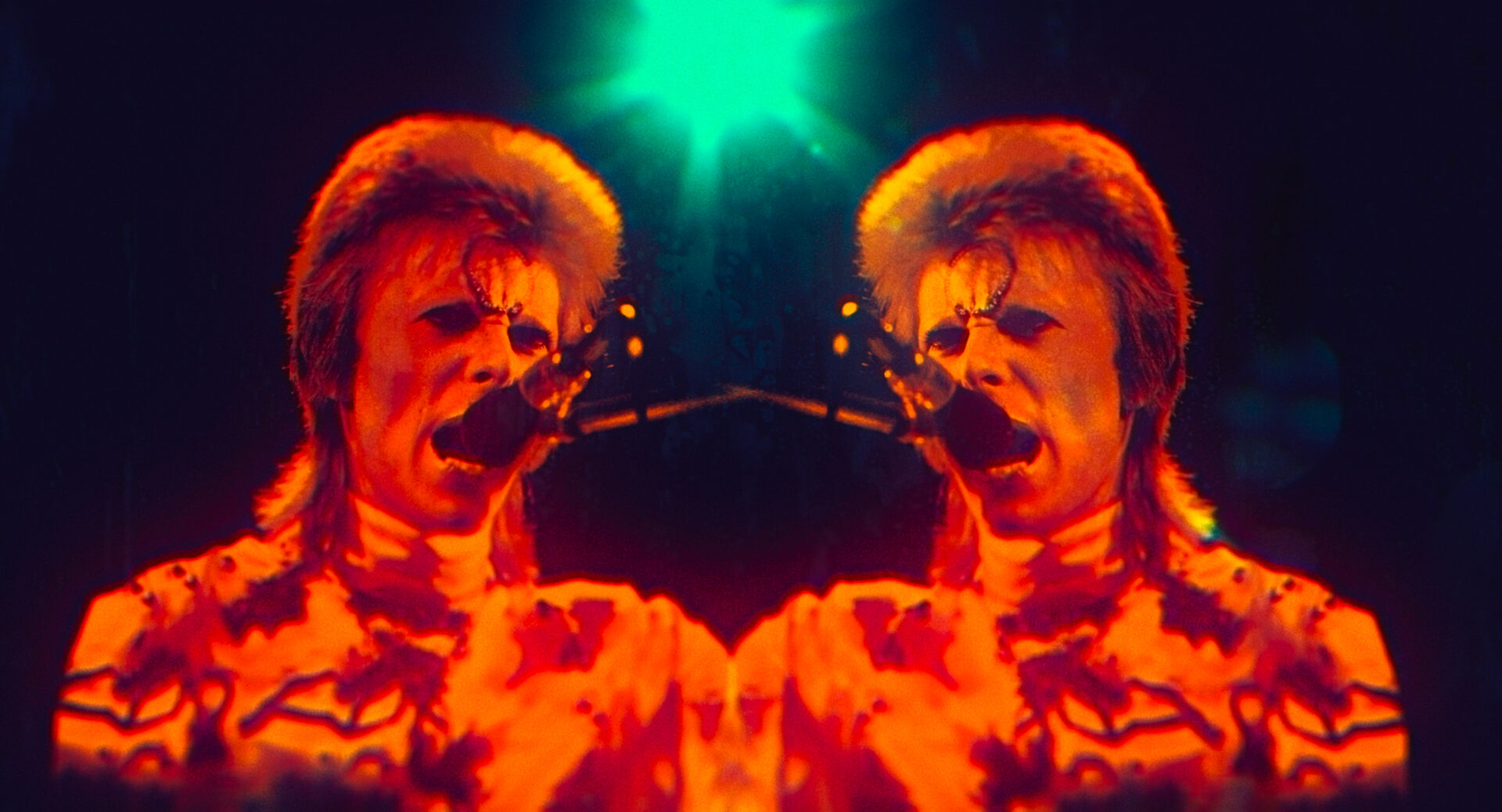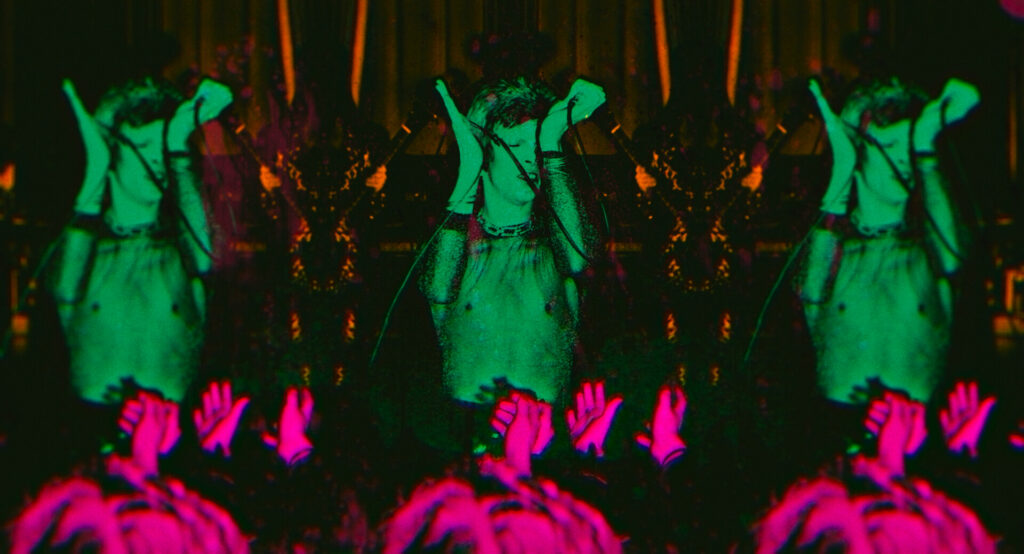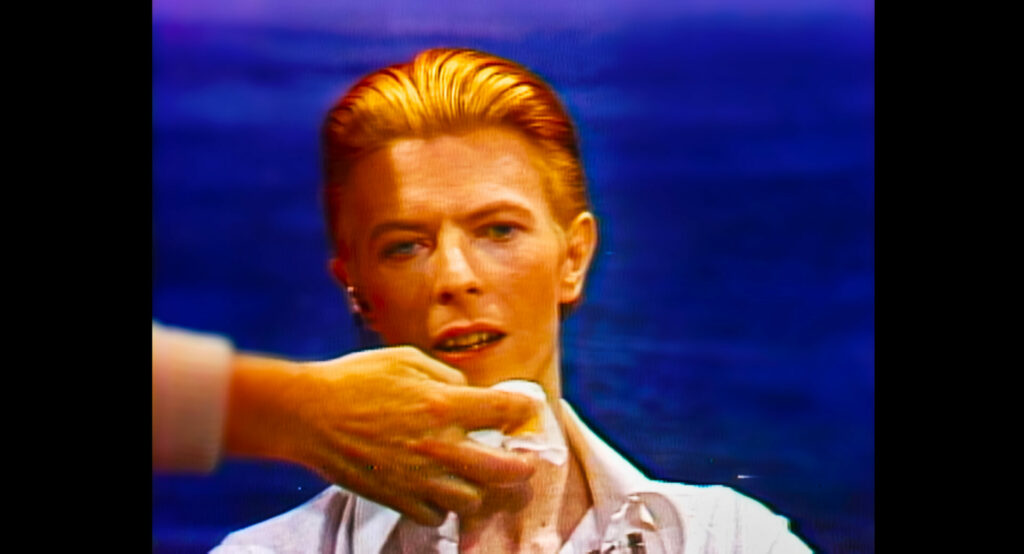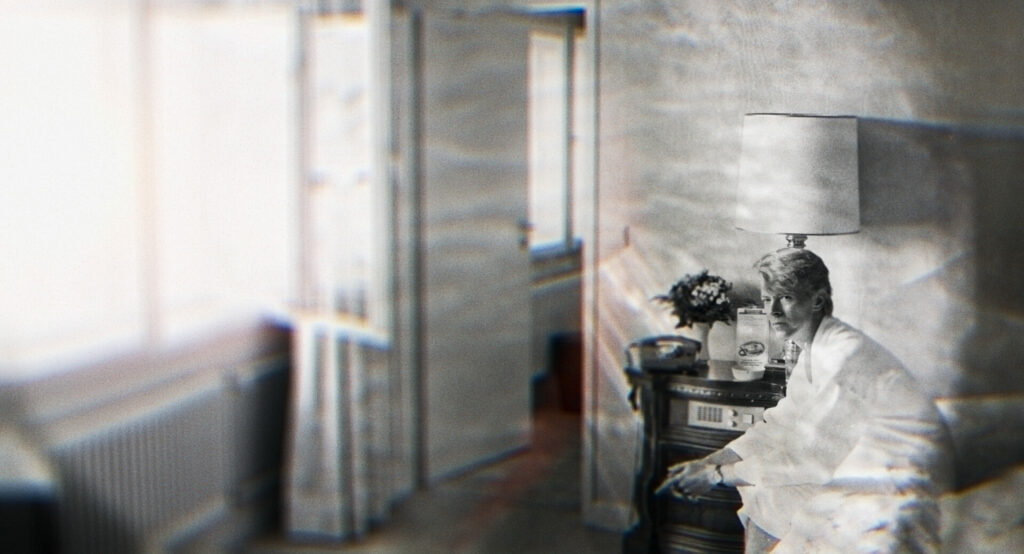The story of ‘Moonage Daydream’, a kaleidoscopic new David Bowie documentary
Brett Morgen’s new documentary captures the Starman’s eternal legacy in an ambitious and beautifully chaotic style. We speak to the director and collaborators about bringing the film to life

As he walks calmly on stage to a stadium of jubilant cheers, dressed to impress as he always was, David Bowie’s soft yet stern voice envelops the cinema in surround sound: “All people, no matter who they are, all wish they’d appreciated life more. It’s what you do in life that’s important. Not how much time you have, nor what you wish you’d done.”
Spoken like an oracle, Bowie’s dreams, doubts, fears, and ideas carry the narrative of Moonage Daydream, a new documentary film that is as kaleidoscopic and beautifully chaotic as the Starman himself. It’s a rock documentary that’s wide in its ambition and content. As filmmaker Brett Morgen (The Kid Stays in the Picture, Cobain: Montage of Heck, Jane) tells Rolling Stone UK: “I wanted to create the David Bowie experience, which is sublime and enigmatic and mysterious, intellectually engaging and emotionally engaging.”
Morgen certainly had all the material to embark upon such a journey. This is the first film about Bowie that is approved and authorised by the Bowie estate, so Morgen was provided with a lifetime’s worth of archive footage (much of it never-before-seen) as well as personal collections of poems, paintings, and interviews of the Brixton-born artist.
But don’t expect a biographical film, Morgen warns. “This was not a film about David Bowie. It was about ‘Bowie’ as a piece of mythology.” The American filmmaker decided early on that he wouldn’t mention dates, facts, or names in the film, to allow himself more artistic freedom with the footage. As such, the film is a colourful collage of sound and vision that plays like Bowie’s unconscious might have; a long music video that stirs the viewer through the inner thoughts of one of the greatest artists of the late 20th century.

“It took me over two years, six days a week, working 12 to 14 hours a day, to just screen through the visual media that I was presented with,” Morgen says, detailing how editing the film over all this time was the greatest pleasure of his life. “I mean, look at how beautiful he is to look at. And it doesn’t even come close to how beautiful his soul was.”
To enter the world of Moonage Daydream is to unlearn and learn again who David Bowie was, or maybe what he was. Also known as David Jones, Ziggy Stardust, Major Tom, Aladdin Sade, the Thin White Duke (or even the titular The Man Who Fell to Earth, or The Prestige’s Nikola Tesla, in films), David Bowie was all these personas and none of them; a person in constant search for reinvention, always pushing his creative and personal limits.
“It took me over two years, six days a week, working 12 to 14 hours a day, to just screen through the visual media that I was presented with”
— Brett Morgen, Moonage Daydream director
One person who knew this more than anyone was Bowie’s longest-running session musician, who played the piano for over 40 years with him, on 19 albums: Mike Garson. Speaking from his Los Angeles home above a keyboard, a few days before performing at the Hollywood Bowl, Garson recounts how Moonage Daydream felt like “a walk down memory lane” and how his serendipitous meeting with Bowie in 1972 would change his life.
At that time, Bowie was already a huge star in the UK, having released genre-defying albums like Hunky Dory, The Man Who Sold the World and of course The Rise and Fall of Ziggy Stardust and the Spiders from Mars. Bowie and his backing band of the time, The Spiders from Mars — which included Mick Ronson on guitar (“this unsung hero” and the “brains of the Spiders,” according to Garson) were in New York for a US tour, but they had one problem: they didn’t have anyone on piano. Rick Wakeman, who was the keyboardist on the album, had refused Bowie’s offer to officially join the Spiders and went with the prog-rock band Yes instead.
Bowie was always on the lookout for new esoteric artists, so in 1972 a mutual acquaintance introduced him to Garson, a pianist trained in jazz and classical who had never even heard of Bowie.
“I auditioned on a song called ‘Changes’,” Garson says casually. “It was an eight-second audition and the first thing I ever played on David’s music. And then it was the last song we ever did live with Alicia Keys for an AIDS benefit in New York in 2006. And that was the last time he ever played live.” To start and end over four decades of creative fusion with a song like ‘Changes’ was something full of mystery and meaning. But “that was Bowie,” Garson says.
“A lot of artists — and certainly, David — maybe don’t know where they’re headed. Out of that chaos comes some form of creativity”
— Paul Massey, Moonage Daydream sound mixer
“I sensed from day one that this was an artist to reckon with, and that he was not your typical rock singer, that he was a multifaceted Renaissance man. I knew it… Many fans, I think they hear one piece like ‘Ziggy,’ or ‘Life on Mars,’ or ‘Space Odyssey,’ and it’s enough for them. But they don’t know that this guy never stopped. When we did the Outside album in 1995, he literally said to me ‘I need to do this album for my own soul, because I feel like I sold out in the 80s.’ And he was painting and doing charcoals of the band as we were improvising.”
“Multifaceted” is right, as Moonage Daydream — unlike a typical biopic or rock-doc — doesn’t focus on Bowie as a singer-songwriter. Instead, the film explores how he was both a Philomath and a polymath, someone who was not just into music, but into every type of artform, and always interested in learning more. As filmmaker Morgen said: “David looked at every moment in life as an opportunity for some sort of growth. For some sort of exchange.”

There are practically no moments of silence in the two hours and 15 minutes the film runs, most of it carried by a voiceover of archive interviews with Bowie. We learn about how his thought process was imbued by philosophical reflections and Zen Buddhist influences. When he was working on the Low album in 1976 with Brian Eno and Tony Visconti as part of the Berlin Trilogy, we hear his vision for the album: “The city person thinks about one thousand different things at the same time, and that’s the type of music that Brian and I are trying to do.”
We also hear Bowie the spiritualist, introducing himself in the early Seventies as “Born in Brixton in 1947. I am a Capricorn, Sagittarius ascendant, Leo descendant.” And Bowie the relentless artist, who told an audience in Japan in the Eighties: “Don’t waste any day, don’t waste a moment. We ought to create our lives daily. I’m still figuring out what I quite like.”
“He was always present, and he went through life with his eyes wide open”
— Brett Morgen, Moonage Daydream director
The long cacophony of sounds during the film is no doubt heightened by the sound mixing, as several channels are often superimposed at once. The effect is one of distorted chaos, but a chaos that engrosses us in the “Bowie experience” Morgen was aiming for.
“Sometimes I think a lot of artists — and certainly, David — maybe don’t know where they’re headed. We didn’t know where we were headed either. And I think out of that chaos comes some form of creativity,” says Paul Massey, the sound mixer on Moonage Daydream. Massey won an Academy Award for Best Sound Mixing on Bohemian Rhapsody and was nominated seven other times. On Moonage Daydream, he lent his talents to create a surround sound system in 12.0, 5.0, Dolby Atmos, and 7.1/5.1 that would “take the audience on a theme park ride”. “What I wanted to do was actually enhance it for the theatrical environment but not really stray too far from what I thought it should be for the fans,” he says.

Whether it was in music, in fashion, or even in LGBTQ+ issues, Bowie left a legacy that was as simple yet powerful as making people feel more confident in themselves. Morgen for instance recalled how he grew up with a speech impediment that made him endure many tough years at school, but then, he found Bowie, “who’s there to tell you it’s OK”. “Up until we had the internet, David was the flag-bearer. He helped us celebrate the individual. There was no one else you could receive that kind of guidance from.”
More than six years after Bowie left us, his memory lives on, and so do the stories of those who live to tell the tales. Pianist Mike Garson shared one of the most haunting experiences he ever had with Bowie. They were on a tour bus in the 1990s, when Bowie told him that in the 1970s he had met a psychic, who told him he would die at 69 or 70 years old. Garson remembered how Bowie firmly believed this, and so did he. In January 2016, Bowie died at 69 after a long battle with liver cancer. Coincidentally, or rather mystically, his 26th and final studio album, Blackstar, was released two days before he passed away. The album is regarded by many fans as a planned final farewell: one of the singles, Lazarus, notably starts with the lyrics: “Look up here, I’m in heaven / I’ve got scars that can’t be seen.”
“Death is a funny word, because there’s no spiritual death, there’s just the death of the body. He’s still talked to me many times in the last six years”
— Mike Garson, David Bowie collaborator
Asked whether he felt Bowie ever feared death, Garson said: “I think everybody is afraid of death when it’s around the corner, and you’re in pain and you’re dying, but I think from a distance he just thought: OK, if I’m going at 70, I better do another 15 albums, I better do a few movies, some sculptures, produce this and that. And he left an amazing body of work. If you think about Black Star, that’s like writing your own requiem. Death is a funny word, because there’s no spiritual death, there’s just the death of the body. He’s still talked to me many times in the last six years. It’s been fantastic.”
Watching Moonage Daydream is to be left with a longing to connect with the Bowie that may be hidden inside all of us: the artist, the thinker, or the perpetual student. In learning more about Bowie, perhaps we might learn a bit more about ourselves. As Morgen says about the elusive Star Man, whom he met in 2007: “He was always present, and he went through life with his eyes wide open.”
Moonage Daydream premieres in the UK on IMAX on 16 September and in cinemas from 23 September.
